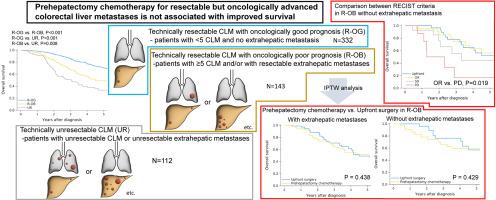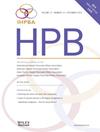Prehepatectomy chemotherapy for resectable but oncologically advanced colorectal liver metastases is not associated with improved survival
IF 2.4
3区 医学
Q2 GASTROENTEROLOGY & HEPATOLOGY
引用次数: 0
Abstract
Introduction
Multidisciplinary treatment strategies are effective for treating colorectal liver metastases (CLM). This study aimed to compare the overall survival (OS) in patients who had resectable but oncologically challenging CLM with reference to the use of prehepatectomy chemotherapy.
Methods
Data were extracted from a prospectively maintained database of patients who underwent liver resection or medical therapy for CLM from January 2005 to June 2022. Initially, our group treated resectable CLM with surgery alone. However, starting in 2015, we gradually adopted prehepatectomy chemotherapy for patients with CLM number ≥5. Survival analysis was adjusted using an inverse probability of treatment weighting (IPTW) analysis.
Results
Among the 587 patients, 332, 143, and 112 were categorized, on the basis of the European Society for Medical Oncology (ESMO) guideline, into the technically resectable CLM with oncologically good prognosis (R–OG), technically resectable CLM with oncologically bad prognosis (R–OB), and technically unresectable CLM (UR) groups, respectively. Among the 143 patients with R–OB, 70 and 73 underwent prehepatectomy chemotherapy and upfront surgery, respectively. OS did not differ significantly between the groups after adjusting for confounders using IPTW analysis (P = 0.438).
Discussion
Prehepatectomy chemotherapy was not associated with better OS in patients with R–OB CLM.

可切除但肿瘤进展的结直肠癌肝转移的肝切除术前化疗与生存率的提高无关。
多学科治疗策略是治疗结直肠肝转移(CLM)的有效方法。本研究旨在比较可切除但肿瘤挑战性CLM患者的总生存率(OS)与肝前化疗的使用。方法:从2005年1月至2022年6月期间接受肝切除或药物治疗的CLM患者的前瞻性数据库中提取数据。最初,我们组仅通过手术治疗可切除的CLM。但从2015年开始,我们逐渐对CLM≥5的患者采用肝前化疗。生存分析采用治疗加权逆概率(IPTW)分析进行调整。结果:587例患者中,根据欧洲肿瘤医学学会(ESMO)指南,332例、143例和112例患者分别被分为预后良好的技术可切除CLM (R-OG)组、预后不良的技术可切除CLM (R-OB)组和不可切除CLM (UR)组。143例R-OB患者中,分别有70例和73例接受了肝切除术前化疗和术前手术。使用IPTW分析调整混杂因素后,各组间OS无显著差异(P = 0.438)。讨论:肝切除术前化疗与R-OB CLM患者更好的OS无关。
本文章由计算机程序翻译,如有差异,请以英文原文为准。
求助全文
约1分钟内获得全文
求助全文
来源期刊

Hpb
GASTROENTEROLOGY & HEPATOLOGY-SURGERY
CiteScore
5.60
自引率
3.40%
发文量
244
审稿时长
57 days
期刊介绍:
HPB is an international forum for clinical, scientific and educational communication.
Twelve issues a year bring the reader leading articles, expert reviews, original articles, images, editorials, and reader correspondence encompassing all aspects of benign and malignant hepatobiliary disease and its management. HPB features relevant aspects of clinical and translational research and practice.
Specific areas of interest include HPB diseases encountered globally by clinical practitioners in this specialist field of gastrointestinal surgery. The journal addresses the challenges faced in the management of cancer involving the liver, biliary system and pancreas. While surgical oncology represents a large part of HPB practice, submission of manuscripts relating to liver and pancreas transplantation, the treatment of benign conditions such as acute and chronic pancreatitis, and those relating to hepatobiliary infection and inflammation are also welcomed. There will be a focus on developing a multidisciplinary approach to diagnosis and treatment with endoscopic and laparoscopic approaches, radiological interventions and surgical techniques being strongly represented. HPB welcomes submission of manuscripts in all these areas and in scientific focused research that has clear clinical relevance to HPB surgical practice.
HPB aims to help its readers - surgeons, physicians, radiologists and basic scientists - to develop their knowledge and practice. HPB will be of interest to specialists involved in the management of hepatobiliary and pancreatic disease however will also inform those working in related fields.
Abstracted and Indexed in:
MEDLINE®
EMBASE
PubMed
Science Citation Index Expanded
Academic Search (EBSCO)
HPB is owned by the International Hepato-Pancreato-Biliary Association (IHPBA) and is also the official Journal of the American Hepato-Pancreato-Biliary Association (AHPBA), the Asian-Pacific Hepato Pancreatic Biliary Association (A-PHPBA) and the European-African Hepato-Pancreatic Biliary Association (E-AHPBA).
 求助内容:
求助内容: 应助结果提醒方式:
应助结果提醒方式:


